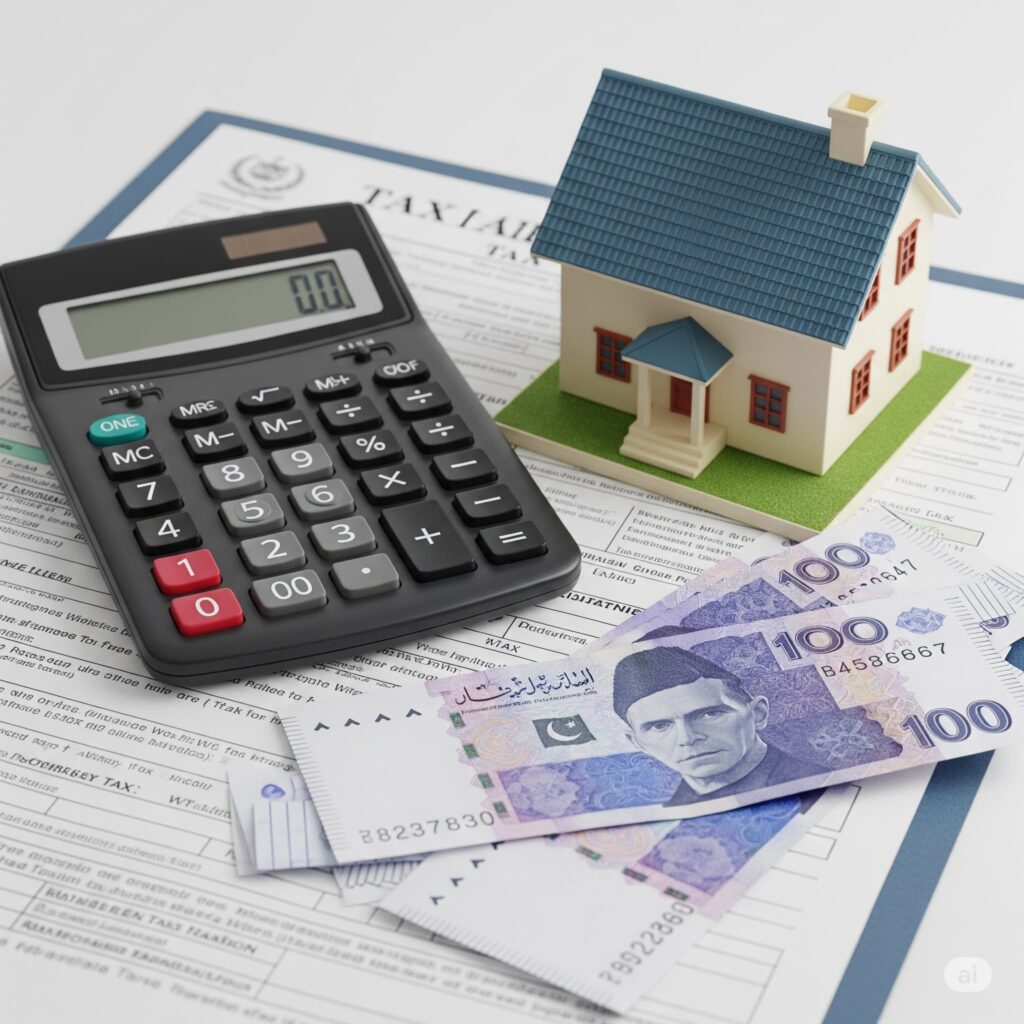Real estate is one of the most dynamic and sought-after investment channels in Pakistan. But whether you’re buying your first home or selling a commercial plot, it’s essential to understand one thing clearly: the taxes involved.
Table of Contents
ToggleIn this guide, we’ll break down the two most crucial tax types in real estate transactions:
- Property purchase tax in Pakistan
- Property sale tax in Pakistan
This isn’t just about knowing the percentage — it’s about understanding when, why, and how these taxes apply.
What Is Property Purchase Tax in Pakistan?
Property purchase tax is the total set of taxes, duties, and fees a buyer pays when acquiring property. These taxes vary depending on:
- The type of property (residential, commercial, plot)
- Whether it’s in an urban or rural area
- Whether the buyer is a filer or non-filer (registered with FBR or not)
- The province the property is located in (Punjab, Sindh, KP, etc.)
💰 Major Taxes Paid on Property Purchase:
| Tax Type | Rate (For Filers) | Rate (For Non-Filers) | Applied On |
|---|---|---|---|
| Stamp Duty | 1% | 1% | DC Value |
| Capital Value Tax (CVT) | 2% | 2% | DC Value |
| Registration Fee | 1% | 1% | DC Value |
| Advance Income Tax | 3% | 6% | FBR or Market Value |
💡 Filer vs. Non-Filer: Filers (those registered with the FBR and filing taxes) enjoy lower rates, while non-filers are penalized with higher taxes.
Example Scenario: Buying a Plot in Islamabad
Suppose you’re buying a 5 Marla plot in Islamabad with an FBR value of PKR 4 million.
Your estimated tax breakdown might look like:
- Stamp Duty: 1% of 4M = PKR 40,000
- CVT: 2% of 4M = PKR 80,000
- Registration Fee: 1% of 4M = PKR 40,000
- Advance Income Tax (Filer): 3% of 4M = PKR 120,000
Total Tax on Purchase: ~PKR 280,000 (for filer)
Looking for plots for sale in Islamabad’s most demanding society? Always calculate taxes before finalizing a deal to avoid surprises.
What Is Property Sale Tax in Pakistan?
When you sell a property in Pakistan, you may be liable to pay Capital Gains Tax (CGT) and Withholding Tax (Advance Income Tax). These taxes depend on how long you’ve held the property and your filer status.
💸 Key Sale-Related Taxes:
| Tax Type | Rate | Applied On |
|---|---|---|
| Capital Gains Tax (CGT) | 0–15% | Gain on sale (based on holding period) |
| Advance Income Tax (Seller) | 1% (filer) / 4% (non-filer) | Sale Price |
Capital Gains Tax (CGT) Rates Based on Holding Period (2025 Update):
| Holding Period | CGT Rate (Individual) |
|---|---|
| Less than 1 year | 15% |
| 1–2 years | 10% |
| 2–3 years | 7.5% |
| 3–4 years | 5% |
| 4–5 years | 2.5% |
| More than 5 years | 0% (fully exempt) |
⚠️ Note: The exemption for holding beyond 4 years only applies to residential property as per latest regulations. Commercial plots may still attract some CGT.
Real-World Example: Selling a House in Wah/New City Phase 2
Let’s say you’re selling a 10 Marla house in New City Phase 2 for PKR 12 million.
You bought it 2.5 years ago at PKR 9 million. You’re a filer.
- Gain = 12M – 9M = 3M
- CGT @ 7.5% = PKR 225,000
- Advance Tax (filer) = 1% of 12M = PKR 120,000
Total Tax on Sale: PKR 345,000
You can explore more on houses for sale in New City Phase 2 to understand current pricing and market trends.
Important Notes for Overseas Pakistanis & Foreign Buyers
- NRPs (Non-Resident Pakistanis) also need to pay these taxes
- Taxes are often deducted at source via banks or legal channels
- Buyers/sellers must ensure all dues are cleared before final transfer
- Hiring a professional real estate consultant or lawyer is recommended
To learn more about local buying protocols, visit about Estate Mate Private Limited.
Tips to Legally Save on Taxes
- Register as an FBR filer to enjoy reduced rates
- Hold property longer (ideally 4+ years) to reduce CGT
- Always calculate taxes using FBR values, not market price
- Use bank transfers to show clean payment trail
- Avoid underreporting property values — it leads to penalties
Government Reforms and Digitization
In recent years, the Government of Pakistan has:
- Introduced online land records in Punjab and Sindh
- Increased focus on documentation and FBR value maps
- Penalized non-filers and under-declared transactions
- Offered amnesty schemes in the past to regularize property investments
These reforms aim to modernize the real estate sector and increase tax transparency.
